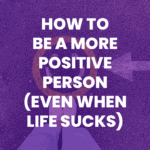Table of Contents
I get fatigued from fluff self-help content—and there’s a lot of it. You know the stuff. You see the bad advice polluting social media but still have no idea how it applies to your life.
The tips are too broad, overly general, like a horoscope with no actionable insights. Often, self-help tips are downright wrong, with zero evidence behind them. Even worse, they carry problematic implications and can cause real damage and wasted effort.
“Stop caring what other people think”
It’s strange.
This advice almost always comes from someone who isn’t particularly nice. It’s usually used to justify terrible behavior.
Consider what it implies: no interest in anyone else’s feedback, no concern for how your actions might impact their life. It also assumes the world is safe for everyone regardless of their identity. Not caring about other people’s thoughts can mutate into remarkably crass behavior.
I get the intent. I’m an introvert. Self-consciousness and social anxiety are a scourge for people like me. The better way of thinking about this issue is to avoid being overly concerned. The distinction in verbiage matters: how we talk to ourselves has huge implications for how we live and feel.
I’ve found that a small splash of insecurity can be good and healthy. It keeps me from acting like a fool.
The power manipulation
My friend gave me an extremely frustrating book. In essence, it was about how women should weaponize sex as a bargaining chip to lord power over men.
Ironically, the book had crazy misogynistic undertones and was full of sweeping generalizations: Men don’t commit, and women commit too soon. Men like having sex, and women like romance. It’s not that every page of the book was 100% false. I just squirm in my seat when people start prescribing hard-and-fast dating rules to another person’s life.
It echoed this common adversarial view of relationships between men and women. It suggested men prey on emotions, so women should prey on sex as a preemptive strike.
Tread very carefully when someone starts telling you to manipulate power dynamics in relationships, be it via sex, money, or the pacing of your love life. It’s a very embittered way of approaching life.
Mantras that solve everything
We tend to have toxic internal narratives, repeating our biggest or most embarrassing mistakes.
Tony Robbins famously gives mantras you should repeat when you are feeling down.
- All I need is within me now.
- All the joy I need is within me now.
- All the love I need is within me now.
They sound nice, poetic, and run headfirst into actual facts. Someone with low self-esteem can’t usually be improved by mantras for more than a few minutes. I love you, Tony. But that’s pseudoscience.
One proven solution: intercept self-talk and simply develop an awareness of it. Mindfulness gives you higher “visibility” of your inner dialogue, allowing you to identify the negativity. Inner demons don’t like being seen. It causes them to retreat into the shadows. Practicing meditation is a good first step.
Mantras are a manufactured representation of the self. They are a superficial layer over the actual problem.
The positivity trap
One of my favorite idioms of all time is, “Other than that, Mrs. Lincoln, how did you enjoy the play?”
It is morbid humor, with the speaker completely clueless that Mrs. Lincoln’s husband has just been shot. Yet it speaks directly to the ham-handedness of toxic positivity that slathers the self-help industry.
“Just cheer up.”
“Always remember the good things.”
It’s the relationship equivalent of telling your wife to “Stop being so upset and calm down.”
University of Virginia psychology professor Dr. Daniel Wegner said, “If you’re really under stress, putting yourself in a good mood by thinking positive thoughts becomes not only difficult—in fact, it backfires, and you get the opposite of what you want.”
One proven alternative is to enlist support and talk to people who are understanding: a therapist, friend, or family member. Even better, go to a place where people are having fun. That tends to lift your mood.
Related:
But Elon Musk said…
The moment someone achieves CEO status of a major company, people treat everything they say as if it came from a holy figure. Their actions are no longer questioned. Their words are gospel, and everything that leaves their lips is a decree from the heavens.
I’m sorry to be the one to break this bad news, but they might not know what the hell they’re doing either. Being accomplished and rising through the ranks of a company doesn’t give someone all the answers.
Sure, billionaires are often extremely talented. But they often got incredibly lucky, came from immense privilege, and had lots of resources available, giving them connections and the backup to fail forty-three times.
Want to know why I’m so cynical about self-help tips? Because I earn much of my livelihood writing in this space. Being immersed in this world, seeing behind the curtain, only further demonstrated that so many people are just making stuff up.
I’ve developed a wet-blanket approach to self-help advice: I want to see an academic study that demonstrates this works. Without one, I assign curiosity for further inspection, but not credibility.
Conclusion
Please be careful, people. Terrible advice often goes viral and leads many people down destructive paths. Consider the source and view it through the prism of your own life. These fortune cookie-esque tips aren’t one-size-fits-all.
To end on a good note, the fact that you are reading self-help advice says good things about you. Your heart is in the right place. Keep going.




